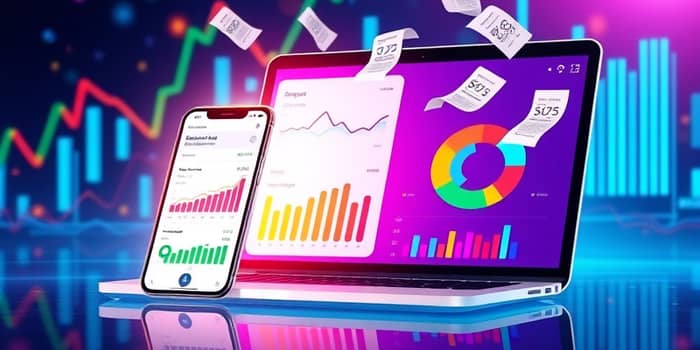Financial empowerment often begins with awareness. When you know where every dollar goes, you can make choices that align with your deepest aspirations. The fusion of expense-tracking tools and digital banking promises real-time visibility into spending, turning uncertainty into clarity. In this age of digital transformation, take a bold step toward mastering your money and unlocking true peace of mind.
Overview of Digital Banking
Digital banking refers to the delivery of banking services through online and mobile platforms, enabling users to perform transactions, view statements, and manage accounts without setting foot in a branch. This model has seen explosive growth; recent data shows that 77% of consumers prefer digital channels, and 96% rate their mobile and online experiences as excellent, very good, or good.
Millennials, comfortable with smartphones and apps, lead the adoption curve, while Gen Z is rapidly catching up as interfaces become more intuitive. Even baby boomers are embracing digital solutions, especially when they eliminate long queues and paperwork. As competition intensifies, banks invest heavily in user experience, reliability, and security to capture this digitally savvy audience.
The shift toward digital banking reflects a broader desire for unparalleled convenience without compromise. Customers demand swift, reliable access to their money, personalized insights, and robust protection against fraud, reshaping how institutions design and deliver services.
Expense-tracking Tools: Features and Benefits
Expense-tracking tools have evolved from offline spreadsheets into sophisticated, AI-driven platforms. By connecting directly to bank accounts, credit cards, and digital wallets, these solutions automate data capture, categorize transactions instantly, and generate insightful analytics.
Consider the impact of replacing manual entry with fully automated expense categorization process. Users save time, minimize human error, and can focus on strategic decisions rather than mundane tasks. These tools often include:
- Real-time alerts for bill payments and unusual charges
- Customizable spending categories and subcategories
- Visual dashboards illustrating income versus expenses
- Forecasting tools predicting future balance fluctuations
Such features nurture a proactive mindset, encouraging users to plan ahead with confidence rather than react to financial surprises.
Moreover, many tools integrate receipt scanning through optical character recognition (OCR), turning paper receipts into digital records in seconds. This function ensures no expense slips through the cracks, reinforcing accountability and budget adherence.
Types of Expenses Explained
To harness these capabilities fully, it’s essential to understand how expenses are categorized. Fixed, variable, and periodic costs each play distinct roles in your financial portrait.
By assigning expenses to these groups, you gain a clear picture of your cash flow and can pinpoint where cutbacks or reallocations are possible. Digital tools make this process seamless, offering customizable tags and bulk editing for fine-tuned control.
Integration with Digital Banking
As banking apps evolve, many now include native expense-tracking modules. The advantage is straightforward: no need to juggle multiple accounts or provide third-party permissions. Data remains within your bank’s secure environment, simplifying setup and reducing risk.
With seamless digital integration across platforms, you can complete daily tasks—checking balances, paying bills, reviewing budgets—all without leaving a single app. Push notifications remind you of upcoming bills, low balances, or spending spikes, helping you stay on track effortlessly.
Personalization features allow you to group accounts, set savings targets, and even share budgets with family members or roommates. This collaborative approach fosters accountability and open communication around money, strengthening relationships through transparency.
Emerging Trends in Digital Banking
The intersection of AI and finance is unlocking new possibilities. Chatbots handle routine queries, while predictive analytics recommend spending adjustments based on past behavior. In the near future, your banking app might suggest optimal times to transfer funds or alert you to opportunities for refinancing debt.
Integration with wearable devices enables on-the-go budgeting: imagine receiving an expense summary as you complete a run with your smartwatch or approving a payment via voice command. Such innovations promise a future where financial management blends seamlessly with daily life.
This dynamic landscape cultivates smarter decisions powered by technology. As institutions adopt open banking standards and richly detailed APIs, third-party developers can craft niche solutions, further expanding consumer choice and tailoring financial experiences.
Challenges and Security Concerns
Despite these advancements, challenges remain. Security is top of mind; breaches and phishing scams can erode trust overnight. Banks respond with multi-layered defenses—end-to-end encryption, multi-factor authentication, and real-time fraud detection.
Yet no system is foolproof. Users must remain vigilant: update software regularly, use unique passwords, and monitor account statements. Educating oneself about common threats and leveraging biometric logins can bolster defenses.
For many, the comfort of a physical branch still holds value. Hybrid models, combining digital channels with in-person service, cater to diverse preferences. This approach ensures that those uneasy with full automation can still access expert guidance when needed.
Future Developments
Looking ahead, financial ecosystems will become even more interconnected. Decentralized finance concepts, blockchain-backed identity verification, and AI-driven advisors will reshape how expenses are tracked and managed. Real-time open banking will allow seamless fund transfers between institutions, enriching user experiences.
Institutions that embrace these trends tend to outperform competitors, as they deliver integrated comprehensive holistic financial solutions that integrate expense management, wealth planning, and lending services into unified platforms. The winner will be the customer who navigates this ecosystem proactively, adopting tools that align with long-term goals.
Choosing the Right Tools for You
With countless options available, selection can feel daunting. Begin by clarifying your priorities: Do you need basic tracking, or do you crave advanced analytics? Are you focused on personal finances, business expenses, or both? What level of automation and AI support do you desire?
Evaluate tools based on security certifications, user interface design, customer reviews, and pricing models. Take advantage of free trials and demos to assess usability and feature sets. Remember, the best tool is one you will consistently use.
For families, shared accounts with permission controls can simplify household budgeting. Businesses may require integration with accounting software and reimbursement workflows. Align features with your unique context for maximal benefit.
Conclusion
Expense-tracking tools bundled with digital banking are more than conveniences—they are catalysts for financial transformation. By automating routine tasks, offering deep insights, and safeguarding transactions, these platforms empower you to take charge of your financial future. The path to financial freedom begins with a single step: mastering your expenses. Embrace the technology at your fingertips and watch as clarity, confidence, and control replace doubt and stress.
Start today: explore your bank’s built-in tools or sample a leading expense tracker. With each mindful decision, you move closer to a secure and prosperous tomorrow.
References
- https://theuxda.com/blog/7-digital-banking-trends-to-elevate-financial-brands-in-2025
- https://www.bankrate.com/banking/digital-banking-trends-and-statistics/
- https://www.homepridebank.com/learn/mobile-banking-in-2025-a-comprehensive-guide-to-convenient-and-secure-financial-management
- https://www.zintego.com/blog/top-9-free-expense-trackers-to-manage-your-finances-in-2025/
- https://www.elements.org/about-elements/news/news-releases/2025/introducing-a-better-online-banking-experience/
- https://www.alkami.com/resources/research/reports/the-2025-digital-banking-performance-metrics-report/
- https://www.fylehq.com/blog/business-expense-categories
- https://impressit.io/blog/digital-banking-trends










